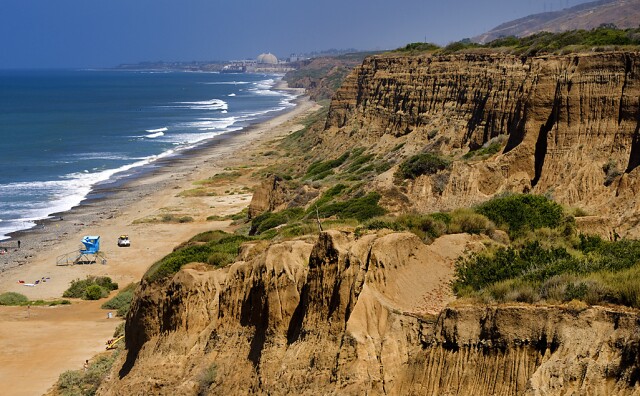-
At LAist, we've thought a lot about how to motivate people to prep for the massive earthquake that's inevitable here in Southern California. We even dedicated an entire podcast to it.
-
We teamed up in 2021 with our friends at the L.A. Times to push Southern Californians to get ready. You can watch that virtual event covering the basics of quake survival. We've also gathered the best of our coverage in a no-nonsense guide to getting ready. No more excuses. Let's do this.
It turns out natural disasters don't just reveal inequality; they actually make it worse.
Earthquakes, fires, floods, hurricanes, all widen the gap. That’s according to sociologist Junia Howell who has studied the aftermath of disaster. Her conclusions are startling.
"If you're white, over time, you're actually going to accumulate more than if you never had that disaster in the first place. But for black people, for Latinos, for Asians — it’s not true," said Howell, who is an assistant professor at University of Pittsburgh and urban research scholar with Rice University.
She and colleagues studied 13 years of data to examine how well people did, or did not, recover after a natural disaster. [Note: She shared two years of additional data with us for the maps and chart below.]
That study found that white Americans who experience disaster accumulate significantly more wealth than any other group, even compared to white counterparts that don’t experience that natural disaster. Howell was interviewed for an episode of our podcast, The Big One, that focuses on what would happen to L.A.’s economy after a major earthquake.
When Disaster Strikes, More Money For Whites, Less For Blacks
Bottom line: Howell’s study found white Americans who experienced natural disaster had the highest predicted wealth accumulation of any racial or ethnic group. Blacks, on the other hand, had an overall loss of wealth when they experienced disaster.
To predict wealth, the researchers took into account the race, education and homeownership status of residents who lived in U.S. counties that experienced disasters. The whiter and more educated you are, the more likely you recover and do even better in the long run.
When we think about what those findings mean for L.A. keep in mind:
Most people who live in L.A. — about 73% — are people of color, according to recent census estimates.
They rent.
They don’t have renters insurance.
They don’t have much money saved.
Less than half of the people in L.A. County have a bachelor's degree.
The things that give you a leg up in recovery — advanced education, assets like a home, the safety net of money in the bank — most Angelenos don’t have.
The Cost Of Disaster Inequality
So just how much does this kind of disparity cost in the long run? In the most extreme cases the researchers analyzed — similarly educated white and black homeowners — the difference was roughly $100,000.
Winners And Losers
For every $100 in white family wealth, black families hold just $5.04, according to The New York Times. The Federal Reserve reports that blacks and Latinos trail whites in home ownership, car ownership, savings and income.
When it comes to recovering from disaster, having wealth in the first place holds the key to putting your life back together.
Stay with us. It works like this: If you own a home and you have insured it, you will probably get the chance to rebuild after it’s damaged or destroyed. That means you potentially come out of the disaster with an updated house that’s worth more than before the disaster.
Howell, whose focus of study is wealth inequality, called home insurance “an amazing safety net” for those who can afford it. At the same time, she said it’s “one of the biggest kind of known elements of how these inequalities unfold.”
Even if you do have renters insurance, and many people do not, you will not see the same benefits. You might recover some of your damages but you won’t be able to build wealth like a homeowner with that rebuilt house has.
Aside from personal insurance, Howell said national and local officials make decisions that affect property value that fall along racial and socio-economic class lines.
“White middle class communities are being favored for the paving new roads, making sure the electricity is back on, making sure homes are back up and running for residents,” Howell said. She added such decisions — even if they aren’t intentionally racist — are tied to deeper issues of inequity when it come to where stores, hospitals and other essential resources are located in communities.
In Houston, for example, houses in disadvantaged neighborhoods had blue tarps for roofs for years after 2008’s Hurricane Ike even though there was a big pot of money set aside to help low-income people. Only 60 out of 2,400 applications for home-repair received federal funding by 2011. Most of the houses without approved applications were in low-income neighborhoods, according to Howell.
Damage caused by the Big One may be indiscriminate, but the process of recovery, especially depending on who you are, will not be.
-
This story was originally published in January 2019 with the launch of the podcast. It has been lightly updated.
-
Sandhill cranes are returning to the Lake Tahoe basin after a century long hiatus in what many say is a conservation success story.
-
Jackie’s partner, Shadow, refuses to abandon their unviable eggs, despite her attempts to nudge him along.
-
We do have some of the same types of buildings here.
-
Switching to an electric heat pump water heater can save you money and help the state avoid power outages.
-
The state's parks department is working with stakeholders, including the military, to rebuild the San Onofre road, but no timeline has been given.
-
Built in 1951, the glass-walled chapel is one of L.A.’s few national historic landmarks. This isn’t the first time it has been damaged by landslides.











